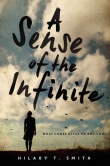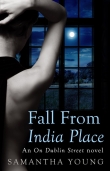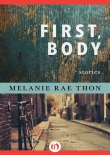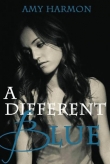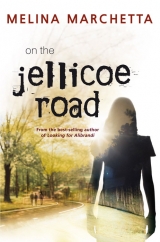
Текст книги "On the Jellicoe Road "
Автор книги: Melina Marchetta
Жанр:
Подростковая литература
сообщить о нарушении
Текущая страница: 11 (всего у книги 16 страниц)
“Is he relaxed out here with you guys?”
“No. Do you know who he reminds me of? You. Distracted and lost and whatever else. Has it occurred to you that the reason you both keep on meeting each other around Hannah’s house might be because you are both desperately missing the same person?”
I shake my head. “Why wouldn’t she have told me?”
“The same reason she hasn’t told you anything else. Maybe she promised someone she wouldn’t. I was there when they returned you to her that day, Taylor. She was crazy. I’ve seen that craziness on my mother’s face when she thinks something’s happened to me or my brother. You and Hannah are connected big-time in some way.”
“I’ve just found out that she’s my father’s sister. I think I’m all she has left. But I’ll never understand why she wouldn’t tell me.”
“Knowing what you’ve told me about her, there would have to be a good explanation.”
I show him the newspaper article about the Brigadier. “Can you explain this?”
He takes a moment to read it. “No, but if I told you what the headlines were the day after my father died, would you think I was a murderer?”
Santangelo looks in again. “Let’s go, Taylor.”
I look at him and nod and he doesn’t move.
“Can we have a bit of privacy?” Griggs asks him, seething.
“Why? So you can make her go crazy?”
“Who was the dickhead who let her break in here tonight? Don’t think for one moment that I’ve forgotten that!”
Raffy pushes Santangelo out of the way and pokes her head in. “Someone is out here,” she hisses, “so can you both tone down the testosterone levels.”
I look up at Griggs and disentangle myself from his grip. “I’ve got to go,” I say, picking up the manuscript and the box from the floor and trying to grab as much of the stuff that fell out as possible. Under the table in the corner, out of my reach, I can see some photos and I stretch to get them but Raffy is urgently beckoning to me and I can’t quite reach.
As I turn to leave, Griggs catches me by the arm. “You’ve always had it wrong about that day,” he whispers. “I had never seen the Brigadier before. He didn’t come looking for me, Taylor. He came looking for you.”
The next morning, Jessa comes into my room and climbs into bed next to me.
“It was on the news,” she whispers. “Two kids from Mittagong have gone missing.” She’s shaking hard so I hold on to her until I feel her heart stop racing and tell her the story of the boy on the stolen bike who saved the lives of those kids on the Jellicoe Road and became our hero.
Chapter 19
I go to see Santangelo’s dad at the police station. He’s working with his head down and when he looks up, he is startled for a moment, like he’s seen a ghost.
“Who do I remind you of?” I ask quietly.
He grimaces, as though he regrets me seeing that look.
“Narnie Schroeder,” he says with a sigh.
“Why did they call her Narnie?”
He walks to the counter and leans forward. I like his face. I trust it.
“She told me once it was what her brother called her when they were toddlers. Couldn’t say Hannah; somehow it ended up being Narnie.”
I nod.
“What can I do for you, Taylor?” he asks, like he’s dreading the answer.
What can he do for me? He can tell me everything he knows.
“I know you’re not going to tell me where Hannah is because she’s probably made you promise not to, so I’m going to make this easy for you. I want to make contact with Fitz and I know you would know where he is.”
He’s shaking his head. The grimace is back but there is even more emotion.
“Please,” I say. “I just want to see him. I need to. Because I’ve worked out that my father is dead and Fitz knew him and Fitz would be here because he was a Townie and I want to know someone who knew my father. Is that so much to ask?”
“I can’t do that, Taylor.”
“Why?” I say, and I realise that I’m close to tears. “Just give me one reason.”
He pauses for a moment and I realise that the tears aren’t just in my eyes.
“Because Fitz is dead.” Nothing comes out of my mouth but a shaky breath. I feel gutted, but these days that’s pretty normal.
“How?” I ask when I find my voice.
He shakes his head. “I can’t tell you that.”
“Can’t because you don’t know?”
“Why don’t I call Raffy’s mum and she’ll come and get you?” he says, and I know he’s not going to give me the answers I need.
“Because I don’t want you to call Raffy’s mum. I want you to call my mum and I know you can do that through Hannah. But you can’t, or won’t, or would love to but not today, thank you very much. Not a good day to hand out information.”
He reaches over and touches my hand and I recoil. I’m embarrassed by my reaction but I keep my distance all the same.
“I promise you this, Taylor. Hannah’s coming back. Hannah will always come back for you. You are everything to her and Jude.”
Jude. Jude’s alive. I feel relief for the first time in ages. Narnie’s alive as well.
“And Tate?”
He hesitates for a moment and then nods and for the time being that has to be enough.
I hear him dial the phone and I know he’s calling someone to come and get me so I turn to leave but then I see a poster on the wall. It’s old—I can tell by the edges—and it’s drawn by a child. Or children. There are two names at the bottom. CHAZ AND RAFFY, 5 YEARS OLD, ST. FRANCIS PRIMARY, JELLICOE. They drew trees, big ones, filled with animals and bird life. So full of colour and imagination and love for this place. I’ve seen this drawing before. My memory is like Hannah’s manuscript—distorted and out of sequence—but instantly I know that years before my mother dumped me on the Jellicoe Road, I had been in this police station.
Narnie and Jude sat side by side watching the police divers.
It was a week since Webb had disappeared and suddenly the focus was on dragging the river. Even the press were there and throughout the day Jude tried to get close to the action, if only to catch a word or glimpse of something constructive he could bring back to Narnie.
“Keep her away,” the young constable advised quietly. “You don’t want her around if we find him.”
“What makes you think you’re going to find him here?”
“Take her home, Jude.”
But Narnie wouldn’t budge. She watched the divers move gradually down the river with a creased concentration on her face, like she was trying to work out a puzzle.
Most of the time, though, they watched Fitz. He kept climbing a tree to the very top branch and throwing himself into the river. Then he’d swim to the surface and make his way up the tree again.
Once Jude thought he saw Fitz watching them from behind the branches and for the first time all day, he left Narnie and made his way up. Climbing had always been Webb’s forte, and both Webb and Fitz could do it with an agility that Jude lacked. By the time he heaved himself onto the branch at the top, the sound of his breathing was only surpassed by the sound of Fitz’s sobbing.
“Fitz? Mate, come out. Narnie and Tate need you.”
There was no answer, just a muffled sound like Fitz was forcing a fist into his mouth to stop himself crying.
“Come on, Fitz.” Jude straddled the branch and moved in closer until he was able to see through to where Fitz was crouched.
But the Fitz in front of him was almost a stranger—caked in mud, his hair matted with debris, his face streaked with dirt and grime.
“Fitz,” Jude whispered. “Where have you been? Why are you doing this to yourself?”
Fitz stood up on the branch and looked at Jude through bloodshot eyes. Barely balancing, he leaned towards him.
“Listen to the sound, Jude,” he said in a hushed voice. “Listen.”
And he threw himself over the side. Jude watched as Narnie waited below, like she did every time, for Fitz’s head to emerge from the water. When Fitz reached the bank, he looked up to where Jude still sat.
“Did you hear that, Jude? Did you?” he called out.
Jude looked down at Narnie again, who was now standing, waiting for what would come next.
“Did I hear what, Fitz?” he called back, confused. To his dismay Fitz began climbing the tree again.
“No. Stay down there, Fitz!”
But Fitz was back up on the branch with Jude. There was blood on his forehead from where he had hit the riverbed.
“I went back,” Fitz whispered. “I went back, Jude.”
“Back where?”
“For the fifth tin,” he answered. “The one I missed. Ping Ping Ping Ping. Remember I missed the fifth tin?” Fitz laughed. His normal crazy laugh. “That’s almost a rhyme.”
Jude’s blood went cold. “What are you saying, Fitz?”
“And when I walked away, I heard something hit the water and I thought I must have killed a fucker of a bird. I looked but I couldn’t see anything.”
“Fitz? What are you saying?”
“Do you want to hear the sound it made?”
Jude lunged, trying to grab him before he went over again, but it was too late. He looked at Narnie, still staring up at him, and started to make his way down the tree.
“When is he going to stop?” Narnie asked quietly after he had sat with her for a while.
Jude didn’t answer.
“Fix things, Jude. Tell him to stop,” Narnie implored.
“I can’t. Let’s go home, Narnie.”
But Narnie shook her head. “I don’t have a home.”
So they stayed. Long after the police divers had gone. Long after the photographers had packed up and disappeared. Long after the Cadets and Townies and Jellicoe kids had headed home.
Watching Fitz. Jump from the top branch. Wade to the bank. Climb up the tree. Jump from the branch. Over and over again. Ten times, fifteen times, his grunts and sobs as he pulled himself out of the water were unbearable. Then Jude realised that he was himself crying and the pain of it was like nothing he had ever experienced. But then Narnie stood and made her way into the river, wading towards Fitz lying exhausted in the shallows. She pulled at his wet clothing with all her strength, the bulk of him hard for her to manage. Then Jude was beside her, dragging them both onto the bank, where Narnie cradled Fitz in her arms, rocking.
“Shhh, Fitz. Shhh.”
He shivered uncontrollably, but Narnie held him close.
“Narnie,” he sobbed. “I’m sorry. I’m sorry.”
“Shhh, Fitz.”
“Forgive me, please. Please. Please. Please. Please.” The words were pouring out of him, soaked with tears and phlegm and spit and blood, as she continued rocking him, while Jude held onto them both.
And at that moment Jude thought something that he would never forgive himself for.
He wished that he had never met any of them.
When I was fourteen years old, I met the Hermit who lived at the edge of the property at the end of the Jellicoe Road. Before I met him, I sensed him, watching. Sometimes I’d call out, but nobody would answer. But on this day, there he was. When I looked into his eyes I saw genuine love. Not guarded love like Hannah’s or crazy erratic love like my mother’s. I saw the real thing. I don’t know why I felt no fear. Maybe he reminded me of the illustrations of Jesus Christ from Raffy’s bible.
I sat with him and he showed me how to make a placemat out of thistles. We let the thistles prick our fingers to make them bleed because they made us feel alive.
Then we spoke about our dreams and how we always felt safe in them, no matter how bad everything else seemed. He told me it was one of the best days of his life and then he took out his gun. A .22 rifle. And he leaned forward and whispered, “Forgive me, Taylor Markham.” Before I could ask him how he knew my name and what I was to forgive him for he said, “Take care of my little girl.”
And then he told me to close my eyes.
And I think I’ve been frightened to do just that ever since.
Chapter 20
Finally we came to an agreement about the Club House and a week before the Cadets are due to leave, we have the opening. My heart’s not really in it and the only people who seem enthusiastic are Ben and Anson Choi and the Mullet Brothers, who have spent every possible moment with each other pretending they are a band.
It amazes me that we’ve got this far, so I suppose that’s something to celebrate. But the thing is we don’t know how to. Thirty people from each faction, ninety people all up, stand around staring at one another with absolutely nothing to say. There’s a stage, a drink machine, and a few tables and chairs but apart from that, there’s nothing else. No personality. No conversation. No atmosphere. Nicht. Nix.
Raffy stands next to me, commiserating, and for once I wish someone would start a fight just to introduce noise to the place. On the other side of the room, Griggs is standing against the wall with that stony look on his face while the rest of the Cadets are huddled in his corner. One of the guys next to him is even clutching a chessboard, like he was forced here in the middle of a game. In another corner Santangelo looks slightly bored, even with his girlfriend hanging off him, and behind me I can feel Richard’s eyes drilling into me as if I am the creator of this hell.
But then I catch Griggs’s eye and he looks at me in a way that tells me exactly what he’s feeling and I love that look. Suddenly I want to yell out to everyone, “It’s a game, these territory wars. They loved each other.”
Instead I turn to Raffy. “See the guy standing next to Jonah Griggs?” I say. “Their chess champ. Apparently no one can beat him.”
She looks at me as if to say, Who cares?
“As if,” I hear Richard say.
“It’s true. Jonah Griggs reckons he’s a freak and that they’ve beaten every GPS School in Sydney.”
“You know what I heard,” Raffy says, catching on. “That he thinks that no one in this area could possibly beat anyone from the city.”
Richard glares at the guy, and I see the challenge in his eye.
“It’d be great if someone took him down a peg or two,” I say, walking away. I approach Griggs, watching as he lifts himself off the wall, not quite sure what he has to prepare himself for, but with a look of relief on his face.
“What?” he asks. There’s vulnerability in his face and I sense that our last session together affected him just as badly as it did me. There are a million things I want to say to him but in the end it seems safer talking about this debacle.
I lean in, trying not to seem too friendly to the rest of the world. “This is a disaster,” I whisper.
“Seen bigger and better ones.” He makes room between him and the chess guy and I feel our fingers touch slightly but neither of us moves away.
“See the guy you punched out the other day?” I say a bit louder. “He’s our chess champ. He thinks no one can beat him.”
He looks at me as if to say, Who cares?
“As if,” I hear the guy with the chessboard say.
“It’s true. He’s a freak and his team has beaten every school in the country comp.”
“He’s up himself,” Griggs says, catching on. “Choi reckons he heard him say that no GPS School from the city is ever going to beat him and his team.”
The guy with the chessboard glares at Richard and I see that challenge in his eye. He moves away from us and stands huddled with some other guys, who follow his gaze towards Richard.
“I reckon I could take them all on,” I tell Griggs quietly.
“You play chess?”
“I can beat him with my eyes closed. Why do you think Richard hates me so much?”
“Because you turn him on and it kills him that he doesn’t turn you on,” he says, looking at me.
“How do you know?” I grin. “That he doesn’t turn me on, that is?”
He laughs and I see that people are watching us. “What do you think would happen if we kissed right here, right now?” he asks, digging his hands into the pockets of his khaki pants, grinning right back at me.
“I think it would cause a riot.”
“Well, you know me,” he says, lowering his head towards me. “Causing a riot is what I do best.”
Santangelo approaches before Griggs gets any closer and pulls him away. “Are you guys insane?” he says, irritated.
“It’s called peaceful coexistence, Santangelo. You should try it and if it works we may sell the idea to the Israelis and Palestinians,” I say, throwing his own words back at him.
“This isn’t peaceful coexistence. This is the worst idea I’ve ever come up with. Everyone’s miserable.”
“I’m not,” Griggs says. “It’s easy.” He beckons over some of the Cadets and introduces me to the first two. “They guarded the hostages,” he tells me. Santangelo already seems to know them. Some of the Townies, who I recognise from the night at the party, come over and shake hands with Griggs and his guys.
I see Trini from Darling House in the crowd and wave her over. She looks hesitant so I drag two Cadets over to her. “These are the guys who looked after our year-seven trio,” I say, looking at them with slightly exaggerated gratitude. “Guarded them with their lives.”
The boys blush in unison.
“Griggs was telling me how it keeps him awake at night thinking of the fear he put in the hearts of those girls,” I say, looking at Griggs.
Trini and her friend look shocked at this news and Griggs gives a shrug. “I presume you are the one responsible for how brilliantly they composed themselves in such a harrowing situation,” he says with such charm. He even accompanies it with a disarming smile.
The girls beam. “We are very strict but fair. Would you like to come and meet the other House seniors?” Trini asks the two Cadets. They nod and another five or six guys follow them across the room.
“We are so sick of each other’s company,” Griggs tells us, watching his guys being introduced to the Darling House girls. “Everyone’s hanging to go home.”
I look at him and feel a sick twist in my stomach. In ten days’ time I will never see Jonah Griggs again. Ever. He looks at me as if he knows what I’m thinking.
Even Santangelo seems flat. “I regret the no-alcohol rule,” he says as we make our way to where some guy is making espressos.
By the time we’ve had our second coffee, the chess game between the Murrumbidgee guys and the Cadets is well and truly underway in one corner. On the other side of the room the Darling girls are surrounded by Cadets while the girls from Hastings House look on in total envy. Then the band comes on and I hate to admit it but they kind of make everything worthwhile. It’s hard to explain what happens when jazz and punk fuse with a violin twist but it works. Probably because Anson Choi takes off his shirt while he’s playing the saxophone. Whoever’s not chatting up a Cadet or a girl from Darling House or playing chess with the guys is watching the band. I turn into a groupie.
Ben plays his violin like a madman and even the Mullet Brothers look cool, having grown sideburns for the occasion. One stares into space in that vacuous way most bass guitarists do and the other does these pirouettes in the air every time he jumps. Unfortunately they only have three songs but the music helps break the ice.
The drummer waves at Raffy and she walks over to the side of the stage to chat with him.
“Who’s that?” Santangelo asks, offering me some chips.
“The arsonist from Clarence House,” I say with my mouth half full.
From the stage Ben catches my eye. “This is for them, Taylor,” he calls out as they begin to play. It’s a song by the Waterboys and, like each time I hear the music played by the boy in the tree in my dreams, I experience a bittersweet sense of nostalgia I have no right to own. When it’s time for Ben to play his solo—his eyes closed, his mind anywhere but here, his fingers so taut and precise that it almost looks painful—my eyes well with tears. Because you know from the look on Ben’s face that he’s somewhere you want to be. Somewhere the five would be each time they were together. The place goes off. I can feel Griggs’s shoulder against mine and I hear him mutter something under his breath.
“What?” I say, irritated. “He’s fantastic.”
There’s a look on his face that I don’t recognise and I don’t quite get it until Ben jumps off the stage, surrounded by Townie girls.
“Hey!” Griggs calls out to him. “Violin guy!”
Ben points to himself with that who me? look, walking towards us.
Griggs doesn’t say anything for a moment, but then he clears his throat. “If I had known…I wouldn’t have gone for your fingers that time.”
“You would have just chosen another body part?” Ben says.
“Probably. But not the fingers.”
Ben nods. “Cheers.” He looks pleased with himself. “I have numbers in this phone that I didn’t have at the beginning of the night,” he says, waving it around.
“No coverage,” Griggs reminds him.
“And mobile numbers are blocked on our land-lines,” I add.
“Thanks for the optimism.”
Ben sees Santangelo still staring at Raffy and the drummer and pats him on the back.
“Nothing to worry about. He set fire to her hair once in science and I think that killed the romance for her.”
“Why would I be worried?” Santangelo asks, irritated, as Raffy walks back towards us.
“You should be worried,” Ben says. “Because you’re going out with that chick and Raff will go out with some guy and you’ll spend the whole time with this ‘thing’ hovering between you and then you’ll get married to other people and one day when you’re middle-aged in your thirties, while both your kids are going to the same school, you’re going to have this affair because of all the pent-up attraction and ruin the lives of everyone in the P and F.”
“Your friends are freaks,” Santangelo tells Raffy when she re-joins us.
“Chaz, I’ve always had freaks for friends. You should know that.”
I look over at Richard, who is clearly dominating the chess game and I nudge Griggs. “Want me to teach you how to play speed chess?” I ask.
I spend the next half hour annihilating Richard and then we play doubles. The head nerd of the Cadets is my partner and when it’s over he asks me for my number. I’m very flattered and he looks a bit crestfallen when I say no.
“It’s because they don’t have coverage out here,” Griggs tells him.
“No,” I say, looking up at Griggs. “It’s actually because my heart belongs to someone else.” And if I could bottle the look on his face, I’d keep it by my bedside for the rest of my life.

